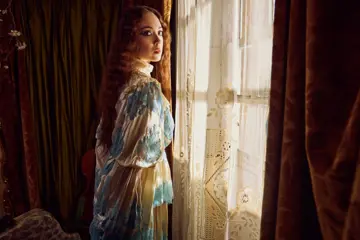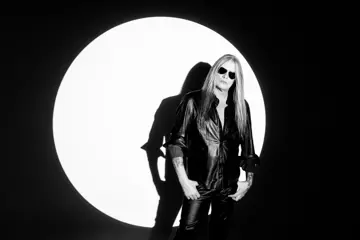More than a quarter of a century after it was first staged in Melbourne, Top Girls – Caryl Churchill's iconic study of women and power – is returning to the MTC. It's set in a UK employment agency in the '80s, where alpha female Marlene has just ousted a man to become the head of the company, but there are also appearances from female figures from across ten centuries. Nikki Shiels plays three characters, who range from Chaucer's Patient Griselda, a medieval peasant wife, to naïve modern girl Jeanine. Shiels explains laughingly, “Jeanine goes into the agency thinking she can have it all, have an international job and travel, and actually she can't even type!”
At first glance it seems as though the women in the play have little in common; alongside careerists like Jeanine and Marlene are juxtaposed figures including Joan Of Ark and Lady Nijô, a Japanese aristocrat who lived in the 13th century. “All [the female characters in the play] have different struggles, but what unifies them is the theme of 'Can women have it all?' Can you be a top executive and a good mother? Can you be the loving and obedient wife, and the people's woman, and not sacrifice your own sense of self?” Shiels doesn't so much sound as though she is cataloguing the themes of the play as genuinely asking these questions.
At 24, Shiels wasn't even born when the play was first staged in 1982, but that's no obstacle. “I think the themes 100% still resonate today. The only thing that makes it a period piece is the 1980s fashion!” She cites recent examples of the perennial 'Having it all' dilemma, including the commentary surrounding the appointment of a pregnant woman as CEO of Yahoo and a divisive recent article in The Atlantic magazine by high-flying US politico Anne-Marie Slaughter called, appropriately enough, 'Why Women Still Can't Have It All'.
Shiels is full of praise for Churchill's ability to juxtapose the personal and the political, using relationships and family dynamics to explore wider themes. “She examines the women of the time behaving like chauvinistic males, which they were fighting against.” What it meant for a woman to wield power was a pertinent question in the early '80s; Margaret Thatcher had just made history as the UK's first female prime minister, but her right-wing policies angered many feminists. Churchill said of her: “Thatcher was no feminist: she had no interest in social equality, she knew nothing of female solidarity”, but the playwright nevertheless regards her as “The great unsung heroine of British Feminism”. Times may have changed, but Australian audiences can still view the play today with the added level of awareness that comes from knowing that as they watch there is a woman running the county.
Don't miss a beat with our FREE daily newsletter
Female power-play may be central to the plot, but as the all-female cast prepares for the opening night it's markedly absent behind the scenes. In fact the cast has been a source of inspiration to Shiels, who says, “We've got a great dynamic in the rehearsal room, some really wonderful women who I'm learning a lot from, both as actors and as women.”
Top Girls runs until Saturday 29 September, MTC, Sumner Theatre.















